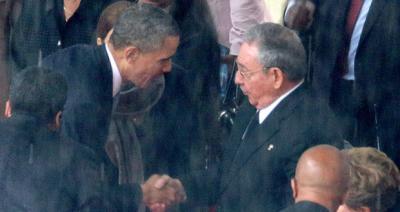“…these 50 years have shown that isolation has not worked. It’s time for a new approach” U.S. President Barack Obama said on Wednesday, December 17, speaking of the standoff between the United States and Cuba. “In the most significant changes in our policy in more than fifty years, we will end an outdated approach that, for decades, has failed to advance our interests, and instead we will begin to normalize relations between our two countries.”
The Cuban Revolution
In 1959, Fidel Castro ousted former President Fulgencio Batista in a revolution that had begun in 1953. Jailed then released by Batista in 1955 for an attempted coup, Castro returned to the island a year later with the iconic Che Guevara, and led a successful guerrilla warfare to overtake Havana. At that time, the island was replete of U.S. business interests and was a well-known tourism destination for Americans. This had been overtly supported by Batista, to the detriment of Cubans, as the revolutionaries viewed it. What ensued this overthrow was a series of events, including the notable Bay of Pigs Invasion of 1961 and Cuban Missile Crisis of 1962, which eventually led to the total freeze of relations between both nations, cutting social, diplomatic and economic ties. But the most stringent of all these was the Embargo – El Bloqueo as the Cubans call it – which is enforced by no less than six statutes under U.S. law.
A ‘complicated history’
“I was born in 1961 – just over two years after Fidel Castro took power in Cuba, and just a few months after the Bay of Pigs invasion, which tried to overthrow his regime. Over the next several decades, the relationship between our countries played out against the backdrop of the Cold War, and America’s steadfast opposition to communism. We are separated by just over 90 miles. But year after year, an ideological and economic barrier hardened between our two countries” Obama said in his speech, summing up the ‘complicated history’ between both nations.
But there is, of course, more to this. What Obama didn’t spell out was the strong alliance between Cuba and the former Soviet Union. Until the collapse of the Berlin wall, Cuba fared well, as it leveraged from the Soviet alliance not only politically, but in many other areas, including essential oil imports to fuel its economy. However, with the dismantling of the Union, the island faced a new crisis. In the 1990s, severe shortages of hydrocarbons caused economic and social implosions which spanned over the decade. Voices rose louder at this stage… and the Cubans which had been exiled or had fled to the U.S. increased their demands for the policies to be relaxed.
Of Cubans… and Cuban Americans
“Neither the American, nor Cuban people are well served by a rigid policy that is rooted in events that took place before most of us were born” Obama underlined. Indeed! What seemed to make sense in the 1960s has now vanished in the memories of many who are either too young or too old to remember. Skeptics will be suspicious of the many friendly terms used by Obama… his phrases spoken in Spanish and his reference to José Marti, the Cuban Independence hero. Even though there are definite ‘interests’ to the Americans re-establishing diplomatic and trade relations, what cannot be fathomed by many of us bystanders is the social impact, which is at the heart of the new approach… that of families being reunited after decades of separation, mostly in the dramatic circumstances of exile.
Fifty Years of Reunion?
“I do not expect the changes I am announcing today to bring about a transformation of Cuban society overnight. But I am convinced that through a policy of engagement, we can more effectively stand up for our values and help the Cuban people help themselves as they move into the 21st century.” So… will it take another fifty years to reunite the U.S. and its Cuban neighbour? Since the Embargo is legally cemented and obstruction to the thawing of the relations may be vehement from some quarters, it is unlikely that Obama will succeed in completing the process within his final term in office. But if Cubans and Americans are to truly to collaborate on the issues announced by the President – health, migration, counterterrorism, drug trafficking and disaster response, to name but these – a definite way forward can thus be paved.
America has also announced Cuba will sit at the Organisation of American States (OAS) summit for the first time next year. This constitutes another sizeable step in Cuba being ad par within the region, at least in political terms. The exile which the island faced from regional blocks has long been the pebble in the shoe of the Latin-American/U.S. relations.
A Hand of Friendship
The hand of friendship being extended will therefore, in the first instance, facilitate travel, trade and financial transactions primarily. In the second instance, it will be about convincing Congress to review the sanctions which have since been codified. In the remaining instances, it will be interesting to watch the geopolitical situation evolve from this renewed friendship. If Raul Castro, the current Cuban President, has remained cautious in the aftermath of Obama’s statement, will his government be able to manage its impact? Will Cuba and its citizens gain from increased connectivity, an outburst of information, modified food, intense tourism… and everything else a drastic change in its unique environment may bring? Will this be the end of the vintage Buicks rolling around the old city… or of the Che Guevara graffiti on the walls in Santa Clara or Santiago? Will the Cuban salsa transmute from external influence? Will Cuban cigars be shamelessly sold at superior prices… and will the people themselves be able to retain their soul? Only time, perhaps indeed another five decades, has the answers…
Fifty Years of Solitude
- Publicité -
EN CONTINU ↻
- Publicité -

